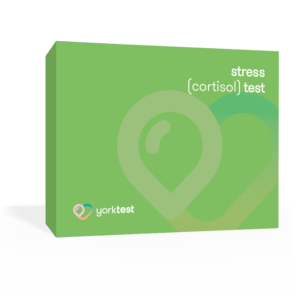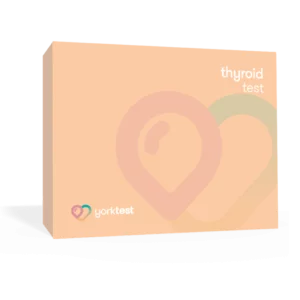As the nights draw longer and colder, thoughts turn to hunkering down and settling into our lazy, cosy winter habits.
Unfortunately, while it’s all very comforting, it’s not always healthy.
Less sunlight and exercise, plus more indulgent food and drink, might feel good at the time, but in the long term it can leave you on a general health downer, and contribute to deficiencies in vital vitamins and minerals.
While we’re all susceptible at this time of year, our research reveals that people under 30, especially younger women, are showing the largest signs of deficiencies in three key areas: vitamin D, vitamin B12, and folate.
Why vitamins?
Take B12, a vitamin vital to the functioning of oxygen-carrying red blood cells, and in turn, energy, cognitive function, and mood.
A B12 deficiency can cause complications including extreme tiredness, heart palpitations, depression, and nervous disorders.
There are several possible causes of a B12 deficiency, which can occur as a result of anaemia, or certain medications. Or it can be as a result of a lack of vitamin intake in a person’s diet.
In the latter case, taking supplements can bring a person’s levels back up to normal. The same is true of folate deficiency, linked with B12 problems, and vitamin D.
Our health tests check for all three deficiencies. Furthermore, the data from thousands of these tests provide us with an invaluable glimpse into the health and habits of the nation – which we’ve used to create the UK Essential Health Check Report 2022.
The data speaks for itself
We took anonymised results from blood samples taking our comprehensive Essential Health Check tests. This MOT for the body tells you a lot about your general health, from cholesterol levels to liver function to vitamin deficiencies you might have.
Focusing in on this last metric, we analysed the results to get a picture of vitamin deficiency, broken down by sex and age. The picture that emerged was striking.
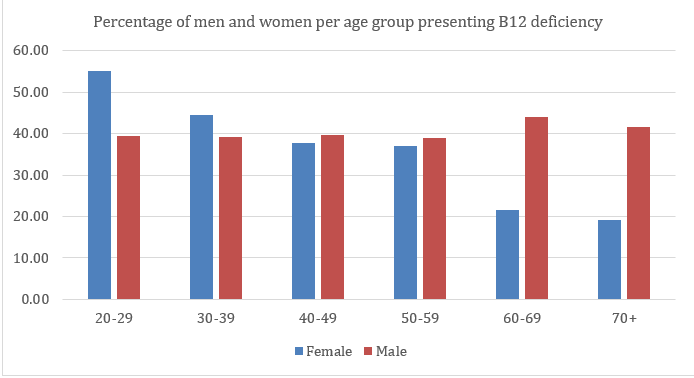
Of the 4,204 tests for B12 deficiency, the majority – 62% – were found in women.
On the surface, it seemed an exactly balanced sample: the percentage of people with B12 levels below the normal range was 39% in both sexes.
But taking a closer look, we found a marked increase in women aged 20-29. Our analysis showed that 55% of women under 29 had a B12 deficiency, compared to only 40% of men in the same age bracket, and 45% of women between 30 and 39.
Furthermore, analysis of over 4,000 samples suggested that 17.1% of all women had low folate levels – but for women in the 20-29 category, this leapt up to 32%. In contrast, only 21.9% of men of the same age were deficient.
Reversing the rules
Normally, levels of vitamins B12 and D naturally decline with age, as the body becomes less able to absorb them from food.
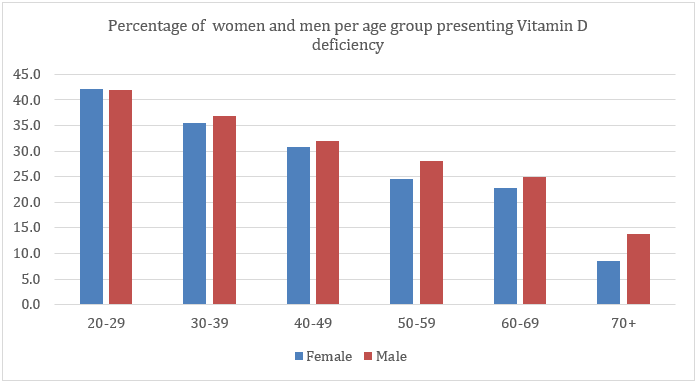
Yet the results from our health tests suggested the opposite. People over 50 showed the highest proportion of healthy levels of both of these vitamins, while people under 30 had the most severe deficiencies.
The fact remains that the body becomes less able to extract vitamins from food and other sources with age. So, what’s going on?
YorkTest scientific director Dr Gill Hart says:
“The data from this study is really interesting. We have known for a long time that the body is less able to assimilate certain vitamins from food as we age.
“But this study appears to show the reverse – that older people coming to YorkTest to have their vitamin levels checked have less deficiencies than those that are younger.
“Of course, we know that the science isn’t wrong about the ageing process, so something else might be contributing to young people having deficiencies in vitamins.â€
Making connections
We know that lifestyle and diet affect vitamin levels as much as general health, which may account why Gen Z seem most at risk of vitamin D, B12 and folate deficiencies.
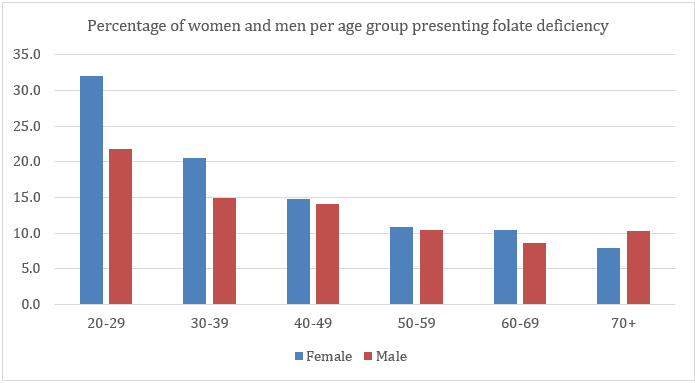
Lifestyle patterns do vary with age – younger people may neglect their diet because they’re busy with work or socialising. And since vitamin levels are known to decrease with age, older people may be more likely to take supplements.
But why do women have much higher rates of B12 and folate deficiency than men of the same age?
One possible explanation of the age gap is that younger people are more likely to follow vegan or plant-based diets than older generations. We know that a vegan diet can lead to deficiencies in various vital vitamins and minerals, including B12, folate and vitamin D.
Whatever the reason, the good news is that in most cases there are ways of reversing these deficiencies and avoiding the complications that can come from them.
A picture of health
The first step is to find out whether there is anything to be concerned about. A full essential health check is a simple procedure which can easily be carried out at home.
Dr Gill Hart, adds:
“Vitamin deficiencies are very common, and don’t always lead to clear symptoms other than a general sense of fatigue and feeling unwell, which we often dismiss. That’s why it is important to get a health check, and test for deficiencies in vitamins. It’s easy and quick and could genuinely change your life.â€
Our own data into who is taking the tests is interesting in itself. People in the 20-29 age bracket were the least likely to go for a health check. Of the tests analysed in our study, only 14% were from people under the age of 30.
Given that it is younger people who, our data shows, are least likely to take tests and at the same time most likely to have vitamin deficiencies, the first step is clear – it seems important that more under 30s need to get tested.
Likewise, the high prevalence of vitamin B12 and folate deficiencies among the females in our study highlights that more young women might be advised to get tested.
Taking control
We know that countries in Northern Europe get among the least sunlight of any in the world. It’s no mystery, then, that a third of adults in the UK suffer from a deficiency of vitamin D – and that levels of the vitamin are at their lowest in spring time. Taking a Vitamin D Test can reveal if there is an existing Vitamin D deficiency and whether supplements are needed.
Sadly there’s nothing we can do about the British weather. Nor can we help the fact that the clocks go back in a couple of weeks and soon most of us will be making the commute to work – and back again – in darkness.
But we can take steps to replenish our bodies of what we lose in the process, with dietary supplements specifically aimed at those with low levels of key vitamins.
Taken over time, these supplements will restore the levels of vitamins in your system, if the original cause is a dietary one.
Food for thought
Of course, we would always recommend having a healthy balanced diet anyway. Poor diet, and other lifestyle habits such as too much alcohol, bring health problems of their own beyond vitamin deficiencies. You’ll find plenty of healthy recipe inspiration here.
While it can be trickier in the case of vegan diets, it’s still possible to be healthy. Virtually all of the foods that contain the highest levels of natural B12 – red meat, offal, game fish, shellfish, milk, cheese, and eggs – are off-limits to vegans, while very few vegan foods provide any meaningful levels.
It’s therefore essential that you seek alternative sources for vitamins such as supplements specially tailored for vegans.
Dr Gill Hart, concludes:
“To really tackle a vitamin deficiency, you should be looking at a mix of healthy diet and lifestyle, and supplements. It’s completely achievable, even if you follow a plant-based diet, and you should see significant health benefits. If you are concerned about your health though you should always visit your GP.”




